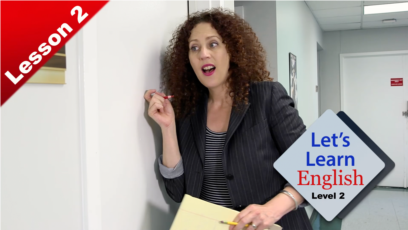Tóm lược (Summary)
Ms. Weaver asks Anna to team up with a person who is different from her. Who will she find?
Bà Weaver nói Anna hãy chọn một người khác tính cô ấy để cùng làm việc. Cô ấy sẽ tìm ai đây?
Hội thoại (Conversation)
Anna: Ms. Weaver is giving new assignments out. I am ready to take on anything she gives me. Well, except reporting traffic from a helicopter. Wish me luck.
Professor Bot: I wonder what Anna’s new assignment will be? Professor Bot here! While you are watching, look for phrasal, or two-word verbs. Some stay together, like “go back” and some can come apart, like “give [assignments] out.” Good luck, Anna!
Ms. Weaver: So, as I said at the meeting last week, I have new assignments for everyone at The Studio. Anna, you're good at asking questions. So, I want you to go back to hosting and reporting.
Anna: That sounds great.
Ms. Weaver: You're also a team player. So, I want you team up with someone ...
Anna: That sounds even better!
Ms. Weaver: ... someone who is very "different" from you.
Anna: That sounds ... what do you mean "different"?
Ms. Weaver: Well, you are very cheerful, you're a people person. I want you to team up with someone who ... isn't.
Anna: Ms. Weaver, I will find that person.
Mimi: Excuse me. Are you using this chair?
Pete: Yes.
Anna: Pete, hi! Thanks for meeting me.
Pete: Sure. But I don’t have lots of time, Anna. I’m busy looking for work.
Anna: Pete, you can tear these want ads up and throw them away! I have good news!
Pete: Anna, I was working on that crossword puzzle.
Anna: Oh. Sorry. Sorry. Pete, forget about the crossword puzzle. I have a job offer for you!
Pete: I'm listening.
Anna: My boss wants me to team up with someone to host a talk show. But the person must be different from me. So, I thought of you.
Pete: Different from you? What do you mean?
Anna: I'm sorry, Pete, I don't have time right now. Here's my boss's address. Your interview is tomorrow morning at 10 am.
Pete: But what do you mean “different”?
Anna: Just be yourself, Pete. Just be yourself.
Professor Bot: Did you find any two-word verbs? Here’s one example. Pete can throw the wants ads away! Throw away is a two-word verb.
Ms. Weaver: Thanks for coming in, Pete.
Pete: Thanks for the opportunity, Ms. Weaver.
Ms. Weaver: I need to find out if you have the skills for this job. And I want you to be completely honest.
Pete: Okay.
Ms. Weaver: First, let's talk about your personal skills. Pete, are you a people person?
Pete: Well, okay, sometimes I think people talk too much.
Ms. Weaver: Pete, what work of yours are you most proud of?
Pete: Last year, I locked myself in a cabin and wrote a book. I didn't speak to anybody the entire time! It was the best two months of my life.
Ms. Weaver: Okay. I think I’ve heard enough.
Anna: Hey! Hey, Pete, how was the interview with Ms. Weaver?
Pete: Well, she said I was grumpy and not good with people.
Anna: And … ?
Pete: And, I got the job!
Anna: I knew it! Congratulations! Let's go celebrate.
Pete: Okay!
Professor Bot: Did you find more two-word verbs? Here is the list.
|
give out |
find out |
|
take on |
tear up |
|
go back |
throw away |
|
team up |
come in |
Động từ gồm hai phần (Two-part verbs)
Từ ngữ mới (New Words)
Sách lược học tập (Learning Strategy)
Setting a goal is important when beginning to study. Learners who set goals put a powerful idea into their own minds: "I will do this by this time." For example, "I will improve my English speaking skills so I can talk with a friend for five minutes in English by next September."
In this lesson, Anna sets a goal: she wants to find someone who is different from herself. Ms. Weaver asked Anna to team up with someone for her new show. Anna asks different people first. Then, she asks Pete, and he says he will talk to Ms. Weaver. She met her goal of finding the right person for the job.
How about you? What is your goal for learning English? How will you use Let's Lean English Level 2 to help meet your goal? Think of what you want to do, and when you will be able to do it. Write to us in the Comments section or send us an email.
Bài kiểm tra Nghe (Listening Quiz)
See how well you understand this lesson by taking a listening quiz. Play each short video, then choose the best answer.






